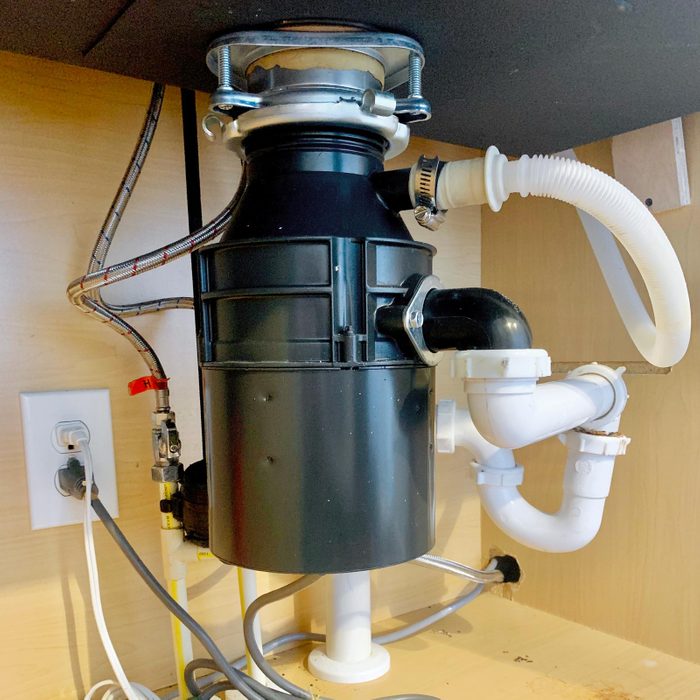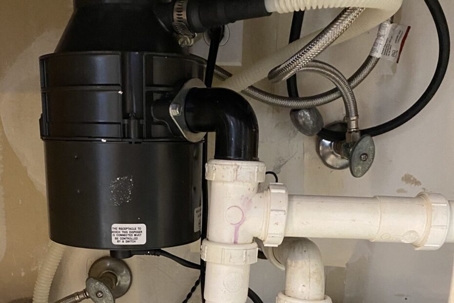Quick Fixes for a Dripping Garbage Disposal
Quick Fixes for a Dripping Garbage Disposal
Blog Article
What are your opinions concerning The Handy Guide To Fixing Your Garbage Disposal Leaking?

Garbage disposals are essential kitchen appliances that aid in throwing away food waste successfully. Nevertheless, a dripping waste disposal unit can be an irritating and messy problem to manage. Fortunately, several leakages can be dealt with quickly with a few straightforward actions. In this post, we will discuss exactly how to repair a leaking waste disposal unit properly.
Introduction
Waste disposal unit are set up under cooking area sinks and are made to shred food waste into smaller sized items, enabling it to pass through the plumbing system easily. While these devices are normally trusted, leakages can occur in time because of damage, loose links, or damage to the unit.
Typical Root Causes Of Leaks in Garbage Disposals
Worn Seals and Gaskets
Seals and gaskets play a vital duty in stopping water from leaking out of the waste disposal unit. Gradually, these elements can degrade, bring about leakages around the disposal device.
Loose Links
The connections in between the garbage disposal and the plumbing system can come to be loosened in time, creating water to leakage out during operation.
Fractures or Holes in the Disposal Device
Physical damages to the waste disposal unit, such as cracks or openings in the housing, can likewise cause leaks.
Identifying the Resource of the Leakage
Before attempting to fix a leaking waste disposal unit, it is necessary to determine the resource of the leakage. This can typically be done via aesthetic assessment or by performing basic tests.
Visual Evaluation
Inspect the garbage disposal system meticulously for any kind of indicators of water leak. Pay very close attention to locations around seals, gaskets, and connection points.
Checking for Leakages
One means to check for leaks is by running water via the disposal system and looking for any kind of noticeable signs of leak.
Tools and Materials Needed for Fixing a Leaking Waste Disposal Unit
Before beginning the fixing procedure, collect the essential devices and materials, including a screwdriver, adjustable wrench, plumber's putty, replacement seals or gaskets, and epoxy or patching material for fixing splits or openings.
Step-by-Step Overview to Fixing a Dripping Waste Disposal Unit
Shut off the Power
Before trying any kind of fixings, ensure that the power to the garbage disposal system is shut off to avoid the danger of electric shock.
Locate the Leakage
Identify the specific place of the leakage and figure out the reason.
Tighten Connections
Utilize a wrench to tighten up any loosened links in between the disposal device and the plumbing system.
Replace Seals or Gaskets
If the leak results from worn seals or gaskets, remove the old components and replace them with new ones.
Patching Splits or Holes
For fractures or holes in the disposal unit, use epoxy or an appropriate patching material to seal the damaged area.
Testing the Garbage Disposal After Repair Work
Once the fixing is total, evaluate the garbage disposal by running water through it to ensure that the leak has actually been resolved.
Preventive Maintenance Tips to Stay Clear Of Future Leaks
To prevent future leaks, it is vital to carry out routine upkeep on your waste disposal unit. This includes keeping it tidy, staying clear of placing non-food products or tough things down the disposal, and periodically looking for leakages or various other issues.
Final thought
Finally, dealing with a leaking waste disposal unit is a reasonably straightforward procedure that can be completed with basic devices and materials. By adhering to the steps laid out in this post and practicing precautionary upkeep, you can keep your waste disposal unit in good working problem and stay clear of costly repair work in the future.
HERE’S HOW TO FIX YOUR GARBAGE DISPOSAL
WHAT TO DO IF SOMETHING IS STUCK IN YOUR GARBAGE DISPOSAL
If the impeller won’t turn, there’s probably something stuck in the disposal. It could be a steak bone or peach pit, although plumbers report pulling all sorts of inappropriate objects out of disposals, such as bottle caps or aluminum foil. Make sure power to the disposal is off, and look inside to see if you can see the source of the jam.
Never stick your fingers in a disposal. Pull out anything you see with tongs or pliers.
If the disposal still won’t work, it may be time to call a plumber or consider buying a new disposal. GEM Plumbing & Heating is here for all of your garbage disposal needs.
WHAT TO DO IF YOUR GARBAGE DISPOSAL DRAIN IS CLOGGED
Take everything out from underneath your sink and put a bucket or other container under your disposal to catch any water that drains out. Disconnect your disposal from the power supply. If it’s plugged into a wall outlet, unplug it. If it’s hardwired into an electrical box, go to the electrical panel and turn off the breaker for the disposal. Pour ¼ cup of baking soda into the drain, followed by ½ cup of white vinegar. Give the solution a few minutes to fizz and do its work. Look into the disposal with a flashlight to see if you can see an object that might be causing the clog. If you see it, remove it using tongs or pliers. MORE TIPS ON DEALING WITH A CLOGGED GARBAGE DISPOSAL
Never use drain cleaner in a garbage disposal. It can damage the plastic parts inside the disposal. You can also be splashed with the caustic liquid while working to clear the clog. Beware! Never stick your fingers into a garbage disposal. Trust us — not a good idea. In many instances, your dishwasher drains through your garbage disposal. This allows the disposal to grind any large food particles that may be drained out of your dishwasher. There are some jurisdictions, however, where the plumbing code prohibits such a connection. WHAT TO DO WHEN YOUR DISHWASHER DRAINS THROUGH THE DISPOSAL
Run some water in the sink so your plunger has at least a ½-inch of water to create a seal and plunge vigorously up and down several times. You may need to repeat this several times. Run hot water down the drain to clear any residue that remains.

I found that piece about Why Is when doing a lookup on the internet. Appreciated our blog entry? Please share it. Help somebody else find it. Many thanks for taking the time to read it.
Check This Out Report this page